 Petzlover
Petzlover Pachon Navarro is originated from Spain but Samoyed is originated from Russia. Both Pachon Navarro and Samoyed are having almost same height. Both Pachon Navarro and Samoyed are having almost same weight. Both Pachon Navarro and Samoyed has almost same life span. Both Pachon Navarro and Samoyed has same litter size. Pachon Navarro requires Low Maintenance. But Samoyed requires Moderate Maintenance
Pachon Navarro is originated from Spain but Samoyed is originated from Russia. Both Pachon Navarro and Samoyed are having almost same height. Both Pachon Navarro and Samoyed are having almost same weight. Both Pachon Navarro and Samoyed has almost same life span. Both Pachon Navarro and Samoyed has same litter size. Pachon Navarro requires Low Maintenance. But Samoyed requires Moderate Maintenance
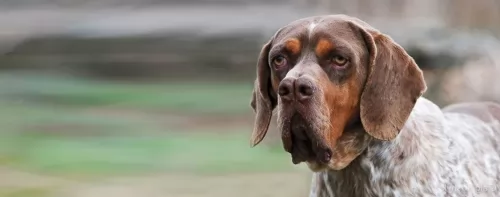 Known also as the Navarra Pointer, this is a Spanish hunting dog native to Navarre, Spain and descended from the extinct Old Spanish Pointer.
Known also as the Navarra Pointer, this is a Spanish hunting dog native to Navarre, Spain and descended from the extinct Old Spanish Pointer.
Major kennel clubs don’t recognize this dog as a standardized breed, but the Spanish Kennel Club has accepted the Pachón Navarro as a breed.
It is believed that this dog has also descended from other hounds as well as the Talbot hounds. It isn’t a new breed as it is thought that the dog originated in the 12th century already. There were times when the dog almost became extinct but efforts to preserve it have been made and to also establish it as a standardized breed.
 The Samoyed is a large breed of dog; a spitz-type dog, with a thick, double-layer coat. The dog was used to help with herding and to also haul sledges for the Siberian Samoyede people.
The Samoyed is a large breed of dog; a spitz-type dog, with a thick, double-layer coat. The dog was used to help with herding and to also haul sledges for the Siberian Samoyede people.
The Samoyed has been used in polar expeditions, including Sir Ernest Shackleton's journey to the Antarctic. They’ve put up with a lot of hardships on these journeys and some of them have lost their lives on these expeditions.
The first standard for the breed was adopted in England in 1909, and in 1923 the original Samoyed Club of America was established.
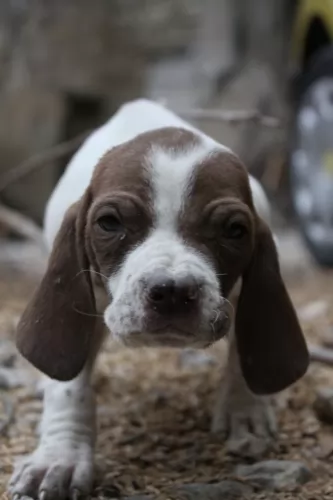 This dog is large sized, standing at between 48 and 57cm in height and weighing between 27 and 33kg. A most unusual feature and characteristic unseen in dogs in general is his split or double nose. The nose of the dog serves the same purpose however, as with any other dog.
This dog is large sized, standing at between 48 and 57cm in height and weighing between 27 and 33kg. A most unusual feature and characteristic unseen in dogs in general is his split or double nose. The nose of the dog serves the same purpose however, as with any other dog.
The head is fairly large with a broad forehead. The broad head of the dog is generally solid colored. The coat of the coat of the dog is short and of a hard texture. Colors of the coat are white and brown or white and black or white and an orangey color with ticking.
The eyes are large and brown, the ears are long and broad with a rounded tip and the tail is long too. These dogs have a strong, sturdy body with strong legs.
The Pachon Navarro is a friendly, social, intelligent, loving and loyal dog. He is also gentle and docile with an amicable nature, making him a splendid choice for those with children in the home as well as pets.
He is athletic and energetic and is going to need a good dose of daily exercise. Apart from their strong hunting instincts, they make excellent family pets and companions and is most certainly not a dog to be put outdoors day after day without the contact of his human family.
He is intelligent and a quick learner and will benefit from training and socialization as this makes him obedient and it also bring about positive changes with any bad behavior from this excellent pet.
He requires a kind, firm, patient and consistent owner. This particular dog won’t be suited to living in a tiny property in the city, as they require a lot of space to run and exercise.
 The Samoyed is a large herding dog standing at between 48 to 60cm in height and weighing 16 – 30kg. He has a thick, double layer coat that is silvery white.
The Samoyed is a large herding dog standing at between 48 to 60cm in height and weighing 16 – 30kg. He has a thick, double layer coat that is silvery white.
The top layer is fairly long and coarse. The dog sheds heavily once or twice a year, but the dog is described as being hypoallergenic.
The ears of the dog are typical spitz-like – erect. The eyes of the dog are almond in shape and while they are usually brown, they can sometimes be blue too. The tail is long and curls over the dog’s back. When these dogs sleep in the snow, you might notice the tail is folded so that it covers the dog’s nose.
The Samoyed is a friendly dog, to such an extent that you wouldn’t call him a good watchdog. They’re friendly dogs with happy expressions on their faces. They make great family pets and will get on well with children as well as other dogs in the home.
Like all dogs, the Samoyed will need early training and socialization to make him obedient and well rounded. He is intelligent and can easily learn a few basic commands.
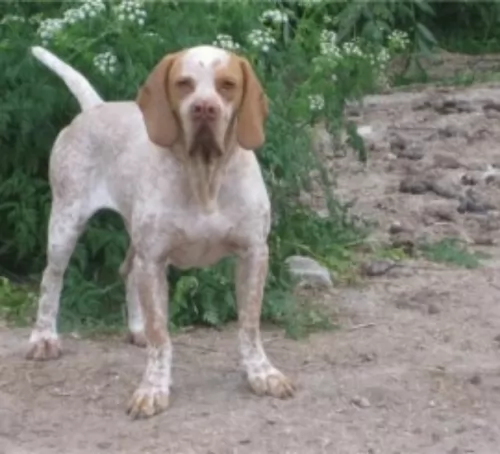 The Pachón Navarro is an active, friendly, playful, affectionate dog and he makes a great family pet. He will however want lots of outdoor exercise, making him a suitable companion for active owners. Inactive city dwellers should think of keeping a more docile kind of indoor pet.
The Pachón Navarro is an active, friendly, playful, affectionate dog and he makes a great family pet. He will however want lots of outdoor exercise, making him a suitable companion for active owners. Inactive city dwellers should think of keeping a more docile kind of indoor pet.
Your Pachón Navarro just loves the company of his human family and will be dejected if made to spend all his time outside and away from his owner.
He also takes his role as guardian and protector seriously. Give him what he requires and make him part of the family and he will be a most remarkable friend and companion.
 The Samoyed is a gentle, easy going dog that gets on well with everyone, loving children and being prepared to be friendly towards other dogs too.
The Samoyed is a gentle, easy going dog that gets on well with everyone, loving children and being prepared to be friendly towards other dogs too.
His friendliness makes it that he doesn’t make a good watchdog. He is intelligent and can be trained to obey basic commands.
He loves plenty of exercise, after all he has always been a working dog. Apart from the coat which will require quite a bit of upkeep, the Samoyed is prepared to come into your home and make you a splendid pet and companion.
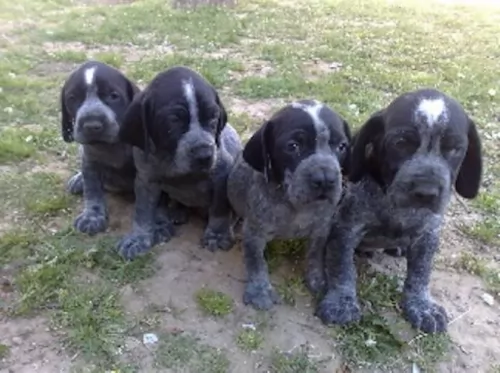 Pachon Navarros are generally healthy dogs and you’re not likely to spend much time at the vets with these dogs. They can reach up to 15 years of age if looked after well, but with the long ears they are prone to ear infections.
Pachon Navarros are generally healthy dogs and you’re not likely to spend much time at the vets with these dogs. They can reach up to 15 years of age if looked after well, but with the long ears they are prone to ear infections.
Moisture, wax and dirt can all build up inside the dog's ears and this can cause a painful ear infection with the dog scratching and pawing at his ear.
Bloat is another illness to look out for and you'll notice your dog is lethargic and has a swollen, hard stomach with gas being trapped inside. The condition is life threatening and will require a trip to the vet.
 Dogs can get diabetes just like people can. Diabetes is becoming more common in dogs as people try and feed their dogs ‘treats’ such as chocolates, biscuits and ice-cream.
Dogs can get diabetes just like people can. Diabetes is becoming more common in dogs as people try and feed their dogs ‘treats’ such as chocolates, biscuits and ice-cream.
Fortunately diabetes is manageable. Certainly, if you discover signs of diabetes in your pet, get him to the vet. The typical symptoms of diabetes in dogs are increased urination, increased thirst and weight loss. Cataracts and blindness can also occur.
Glaucoma is when there is increased pressure in the eye. It can be hereditary or secondary where there is decreased fluid in the eye because of other eye diseases. Symptoms include pain and even vision loss. It can be treated surgically or with eye drops.
This is an inherited condition in dogs where the thighbone doesn't fit properly into the hip joint. Some dogs will even have lameness in both rear legs. The vet will want x-rays to diagnose hip dysplasia. Unfortunately arthritis can also develop.
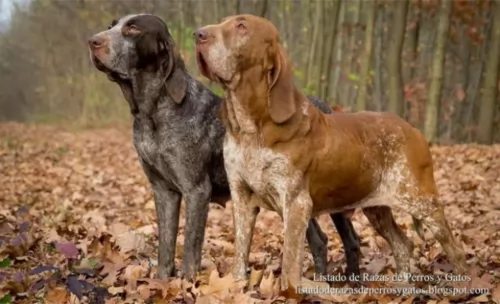 Your Pachon Navarros is a low maintenance dog and you will just be required to give him a good brush. He is a moderate shedder and this brushing down will keep the skin and coat healthy.
Your Pachon Navarros is a low maintenance dog and you will just be required to give him a good brush. He is a moderate shedder and this brushing down will keep the skin and coat healthy.
Because of his long, floppy ears, you will need to check inside them because moisture, dirt and wax can build up and encourage an ear infection. Don’t try to clean inside your pet’s ears if you’re not sure how, rather find out about cleaning the ears from the vet.
The nails will also need to be clipped as well as checking regularly on the eyes and teeth.
Your Pachon Navarro is a hardworking dog and you want to ensure tasty, palatable food that is properly digested and eliminated without problems. If you feed your dog a commercially manufactured dog food, choose the best quality and check out the labels.
Make sure that the food doesn’t contain lots of preservatives, colorants and fillers. Some of the best kibble has the right balance of vitamins and minerals in them. With these kind of hunting dogs, it is best to feed your dog hours before vigorous exercise such as a hunt.
Try and vary the regular kibble by adding in simple, but tasty home-made food occasionally. Dogs appreciate simple food without spices and exotic ingredients as its keeps their stomachs free from pain, gas and bloat.
Some chopped up boiled chicken, some brown rice or pasta and some vegetables such as sweet potato, carrots and spinach is super healthy for your pet as well as adding in a little bit of raw meat from time to time.
Remember clean, fresh water must be constantly available.
 The coat of the dog is super thick and in the Spring, the dog sheds a lot. Samoyed dog owners will need to be regular with their brushing routine with these dogs as the coat can easily tangle. Some people just prefer to get their Samoyed to a professional groomer.
The coat of the dog is super thick and in the Spring, the dog sheds a lot. Samoyed dog owners will need to be regular with their brushing routine with these dogs as the coat can easily tangle. Some people just prefer to get their Samoyed to a professional groomer.
This is a working dog, used to working hard in all kinds of conditions. He doesn’t take kindly to being bored with nothing to do and he howls and barks till you take him on a walk. He requires regular exercise such as hiking, ball games, running and swimming. It is why this dog isn’t suited to life on a small property in the city. He requires a large garden or farm and lots of exercise.
If you want your Samoyed to be healthy so that you’re not constantly at the vet, provide him with top quality food. It is always useful and convenient having commercially manufactured food but you want to vary the diet just a bit by providing some homemade food too.
If you boil chicken, brown rice or pasta and spinach, sweet potatoes and carrots in a pot you can chop it all up and freeze it and feed portions twice a week to your dog. Warmed up it can be added to his dry kibble and be a wonderful tasty treat for him. Every now and then you can also include some raw meat which can be beneficial for his skin. Ensure there is always a bowl of fresh, cool water within his reach.